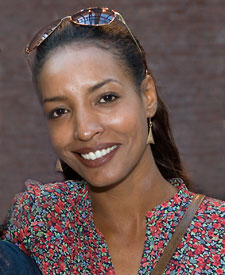


Student, Sammy Ofer School of Communications, Interdisciplinary Center, Herzliya, Israel
Mazal "Mali" Aklum has learned well the importance of remembering history. Her parents were among the first wave of Ethiopian Jews to flee their country and settle in Israel in the 1980s. As a member of this little-known minority, whose history is often overlooked, Aklum has a unique perspective on the breadth of Jewish identity and the importance of preserving memory.
Transcript also available in:
اُردو میں پڑھئیے
Português (BR)
MAZAL AKLUM:
"Who are you?" And, "How you fit?" And, "What is your story?" Which is very simple question but very, very important question. Very important question.
ALEISA FISHMAN:
Mazal "Mali" Aklum has learned well the importance of remembering history. Her parents were among the first wave of Ethiopian Jews to flee their country and settle in Israel in the 1980s. As a member of this little-known minority, whose history is often overlooked, Aklum has a unique perspective on the breadth of Jewish identity and the importance of preserving memory.
Welcome to Voices on Antisemitism, a podcast series from the United States Holocaust Memorial Museum made possible by generous support from the Oliver and Elizabeth Stanton Foundation. I'm your host, Aleisa Fishman. Every other week, we invite a guest to reflect about the many ways that antisemitism and hatred influence our world today. Recorded at the United States Holocaust Memorial Museum, here's Mazal Aklum.
MAZAL AKLUM:
"How you identify yourself?" That’s not an easy question. Especially if you are part of a lot of minorities, as I usually describe it. Because first of all, I would describe myself definitely as a woman, and then as a black woman, and then as a Jewish black woman, and finally Israeli. So, my roots are very important, but each one of them are not easy for me. And I always need to explain myself. And I feel a little bit frustrated, because I need to prove my Judaism always, when the others feel very natural. And living in Israel, in a Jewish country, which usually identifies the Jewish people from Europe, I always need to convince others and explain how it’s possible to be Ethiopian and also Jewish.
The differences between me and Europe Jewish is the color. You're going with the color always. And if people will not understand the story, the process, and the history, they will wonder 100 years from now, how come that you are Jewish? Because you're probably from Africa. And it’s dangerous because horrible people, unfortunately, in the Holocaust considered Jewish as a race—which it's not. Jewish people come with a lot of different colors and a lot of different languages. And it's not about the Europe Jewish and it's not about Moroccan Jewish, it's about Jewish as a way to live your life.
It has to start from the Jewish people themselves, because if the Jewish people don’t know about this part of the history, how can I approach someone that is not Jewish and expect for him to know the story about the Ethiopian community? So, first of all my goal is to teach the Jewish people. And then, I’ll go more than that. Because when you know from where this person is coming, and what is his story, people respect you better.
ALEISA FISHMAN:
Voices on Antisemitism is a podcast series of the United States Holocaust Memorial Museum. Join us every other week to hear a new perspective on the continuing threat of antisemitism in our world today.
We would appreciate your feedback on this series. Please visit our Web site, www.ushmm.org, and follow the prompts to the Voices on Antisemitism survey. At our Web site, you can also listen to Voices on Genocide Prevention, a podcast series on contemporary genocide.